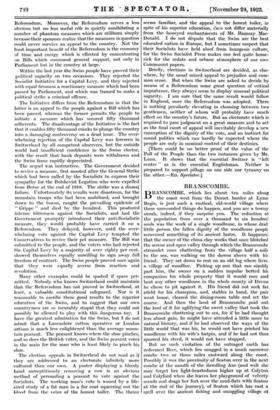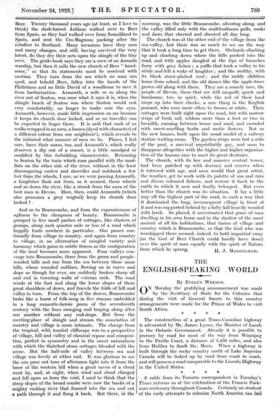BRANSCOMBE. .
putRANSCOMBE, which lies about ten miles along - the coast west from the Dorset border at Lyme Regis, is just such a rustical, old-world village where these unrecorded things do happen, and you are a towny sirrah, indeed, if they surprise you. The reduction of the population from over a thousand to six hundred souls was the work of a single woodlouse, in whose drat little person the fallen dignity of the woodlouse people recovered something of its ancient lustre. It happened that the owner of the china clay works that once blotched the serene and open valley through which the Branscombe streamlet runs chattering from the village . half a mil( to the sea, was walking on the downs above with hi: friend. They sat down to rest on an old log where live a village of woodlice. Picking up one that ran nimbly past him, the owner on a sudden impulse betted his companion his whole property that it would- race and beat any other woodlouse in the whole county of Devon he chose to pit against it. His friend did not seek far afield for his champion, and, stables in hand, the pair went home, cleared the dining-room table and set the course. And then the land of Branscombe paid out the lord of it for uglifying the sweet valley that took the BranscoMbe chattering out to sea, for if he had thought less about gain, he might have attended a little more to natural history, and if he had observed the ways of the little world that was his, he would not have pricked his woodlouse with his wife's hatpin, and if he had not thus spurred his steed, it would not have stopped.
But no such visitation of the outraged earth has redeemed Beer, which lies snugged in a much narrower eoinbe two or three miles eastward along the coast. Possibly it was the proximity Of Seaton over in- the next coinbe at the mouth of the dawdling Axe (and well she may forget her light-heartedness higher up at Colyton and Colyford when she leaves her playground' of Velvety meads and dragi her feet over the mud-flats with Seaton at 'the end of the- journey); of Seaton which has cast a spell over the ancient fishing and smuggling village of Beer. Twenty thousand years ago (at least, so I love to think) the dark-haired Azilians walked over to Beer from Spain, as they had walked over from Somaliland -to Spain, and sent the Cro-Magnons packing after the reindeer to Scotland. Many invasions have they seen and many changes, and still, having survived the very -latest, do -they dry their nets upon the shingle of the tiny cove. The guide-book says they are a crew of an Armada warship, but then it calls the new church of " hand- some," so that its statements must be received with caution. They turn from the sea which no man can spoil, and behold .Beer, fallen into the hands of the Philistines and no little David of a woodlouse to save it from barbarization. Axmouth, a mile or so along the river out of Seaton, was once what it says it is, when the shingle beach of Seaton was where Seaton would rest very comfortably, no longer to make sore the eyes. Axmouth, however, made little impression on me because it keeps its church door locked, and so no traveller can be expected to linger there. It is said that each of us -walks wrapped in an aura, a lumen (dyed with character) of a different colour from our neighbour's, which reveals to the initiated what manner of men we be. Places, I feel sure, have their auras, too, and Axmouth's, which really deserves a dip out of a sunset, is a little smudged or muddied by this forbidding characteristic. Returning to Seaton by the train which runs parallel with the mud- flats on the other side of the river, without in the least discomposing curlew and shoveller and redshank a few feet from the wheels, I saw, as we were passing Axmouth, a kingfisher flash out from, as it seemed, those wheels and so down the river, like a streak from the aura of the best man in Devon. How, then, could Axmouth (which also possesses a grey .wagtail) keep its church door locked ?
And so to Branscombe, and from the expensiveness of ugliness to the cheapness of beauty. Branscombe is grouped in five small parties of cottages, like clusters of gossips, along each quarter mile or less of a road which happily leads nowhere in particular. One passes con- tinually from village to country, and again from country to village, in an alternation of mingled variety and . harmony which gains in subtle fitness as the configuration of the land becomes more apparent. Four valleys con- verge into Branscombe, three from the green and purple- wooded hills and one from the sea between those same hills, whose rounded outlines, flowing on in curve and slope as though for ever, are suddenly broken sharp off and end in towering walls of veteran rock. The road winds at the foot and along the lower slopes of these great shoulders of down, and travels the folds of hill and valley in turn. ' From the top of the downs, Branscombe looks like •a burst of folk-song in five stanzas embedded in a long romantic-heroic poem of the seventeenth century with the lines swinging and looping along after one another without any end-stops. But from the meeting-place of shingle and stream the association of country and village is more intimate. The change from the tropical, wild, tousled cliffscape was to a perspective of village, hill and valley of classical repose and composi- tion, perfect in symmetry and in the sweet naturalness with which the thatched stone cottages blended with the scene. But the half-mile of valley between sea and village was lovely at either end. It was glorious to see the sun pour out tons of afternoon light into it from the brOw of the western hill when a great raven of a cloud went by, and, at night, when wind and cloud charged and fell upon us from the void, I used to think that the steep slopes of the broad coinbe were now the banki of a mighty rushing river that foamed into the sea and • cut a path through it and flung it back. But 'there, in the morning, was the little Branscombe, silvering along, and the valley filled only with the multitudinous gulls, rooks and daws that cheered and. shouted all day long. The church was at the other 'end of the village from the sea-valley, but there was so much to see on the way that it took a long time to get there. Orchards climbing up and climbing down where the hills pushed into the road, and with apples dangled at the tips of branches furry with grey lichen ; a yaffle that took a valley in his stride and left a wake of laughter ; and the smithy, with its black straw-plaited ,roof ; and the ruddy children home,from school, and the old daines, like the apple-trees grown old along with them. They are a comely race, the people of Devon, those that arc still unspoilt, quick and handsome, too, in spirit, while the red of their land crops up into their cheeks, a rare thing in the English peasant, who runs more often to brown or white. Their cottages were built right upon the road, but with narrow strips of fresh soil, seldom more than a foot or two in breadth, running between house and road, and crowded with sweet-smelling herbs and rustic flowers. Not so the new houses, built upon the usual model of a railway station waiting-room. The garden-strips were but a relic of the past, a survival'unprOfitably gay,, and soon to disappear altogether with the higher and higher organiza- tion of the human race to meet its great destinies.
The church, with its low and massive central tower, had been patched up -with decency and reserve when it tottered with age, and soon would that great artist, the weather, get to work with its palette of sun and rain and divers coloured lichens, and restore it back to the earth to which it now and finally belonged. But even better than the church was its situation. It lay a little way off the highest part of the road, in such a way that it dominated the long, inconsequent village in front of it and was supported behind by a lofty hill heavily wooded with larch. So placed, it accentuated that grace of man dwelling in his own home and. in the shadow of the most ancient of all his habitations, that fusion of village .and country which is Branscombe, so that the God who was worshipped there seemed, indeed, to hold impartial sway (as the God of Beer Church could hardly have done) over the spirit of man equally with the spirit of Nature



















































 Previous page
Previous page